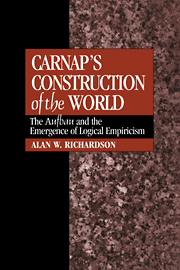Book contents
- Frontmatter
- Contents
- Acknowledgments
- Introduction
- 1 Reconstructing the Aufbau
- 2 The problem of objectivity: An overview of Carnap's constitutional project
- 3 An outline of the constitutional projects for objectivity
- 4 The background to early Carnap: Themes from Kant
- 5 The fundamentals of neo-Kantian epistemology
- 6 Carnap's neo-Kantian origins: Der Raum
- 7 Critical conventionalism
- 8 Epistemology between logic and science: The essential tension
- 9 After objectivity: Logical empiricism as philosophy of science
- Bibliography
- Index
4 - The background to early Carnap: Themes from Kant
Published online by Cambridge University Press: 30 October 2009
- Frontmatter
- Contents
- Acknowledgments
- Introduction
- 1 Reconstructing the Aufbau
- 2 The problem of objectivity: An overview of Carnap's constitutional project
- 3 An outline of the constitutional projects for objectivity
- 4 The background to early Carnap: Themes from Kant
- 5 The fundamentals of neo-Kantian epistemology
- 6 Carnap's neo-Kantian origins: Der Raum
- 7 Critical conventionalism
- 8 Epistemology between logic and science: The essential tension
- 9 After objectivity: Logical empiricism as philosophy of science
- Bibliography
- Index
Summary
we have had occasion to note Carnap's advocacy of Kantian themes in his early philosophical thought. But, of course, Carnap is not adopting Kantianism in all its details– too many aspects of Kant's own philosophical thought were rendered implausible, if not simply exposed as mistaken, by scientific and mathematical advances in the nineteenth and early twentieth centuries. Carnap's early views are much more substantially informed by the views of the scientific neo-Kantians of the early twentieth century. These neo-Kantians both took considerable insight from Kant's own work and significantly changed some central Kantian tenets. Thus, for an understanding of Carnap, it is the work of the neo-Kantians that is of primary importance. Nevertheless, the best place to start in examining the work of the neo-Kantians is with the metaphysical and epistemological positions of Kant himself and the problems that arose for these positions in the evolution of scientific, mathematical, and logical theorizing in the years between Kant and Carnap. With this in hand we will be better able to see the continuities and discontinuities between neo-Kantian and Kantian thought. Thus, in this chapter we shall reconstruct some themes in Kant's account of the synthetic a priori and its role in objective, theoretical knowledge. In the next, we shall see how the twentieth-century neo-Kantians take up these themes in the post-Einsteinian era.
THE KANTIAN PROBLEMATIC
In this section I will briefly review some of the major themes in Kant's account of scientific and metaphysical knowledge, as presented in the Critique of Pure Reason (Kant 1781/1787/1965) and related documents. I will then explain how post-Kantian scientific advances rendered some details of Kant's account implausible.
- Type
- Chapter
- Information
- Carnap's Construction of the WorldThe Aufbau and the Emergence of Logical Empiricism, pp. 92 - 115Publisher: Cambridge University PressPrint publication year: 1997



